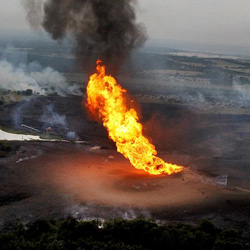Alternative fuel in Jordan can provide the country with up to 30 days of its electricity needs but not more, as natural gas supplies from Egypt has completely halted, according to Qatiba Abou Qoura, the Kingdom's energy minister.
Gas pipelines delivering Egyptian natural gas to Jordan and Israel were hit on Thursday for the seventh time since February, forcing their shutdown. Jordan, which depends on Egyptian gas for some 80 per cent of its energy needs, will be forced to switch to fossil fuels to compensate for the stoppage.
The minister told the Jordanian news agency that talks are being held with Egyptian authorities to determine the magnitude of the damages resulting from yesterday's blast in northern Sinai. He added that Egypt provided a daily amount of around 150 million cubic feet of natural gas to Jordan.
Over the course of the past 3 months, Egypt was negotiating with Jordan over the increase of the price of the exported natural gas. Sources say the two countries reached an agreement on the new price, but a contract has not yet been signed.
Egyptian natural gas is sold to Jordan at around $3-5 per million British Thermal Unit (BTU), while international prices range between $6 and $7. The contract review was initially scheduled for 2018.
A previous gas deal between Egypt and Jordan was signed in 2004 and was meant to last 15 years. It stipulated the export of 240 million cubic feet of gas per day, enough to generate around 80 per cent of Jordan's power.
In July 2010 the two countries agreed to, but did not sign, a deal for additional exports that would bring the total figure to 300 million cubic feet per day of gas.






